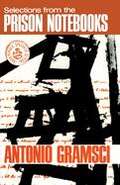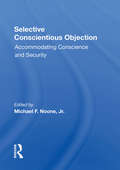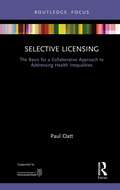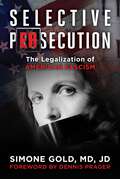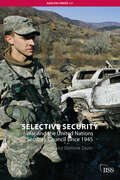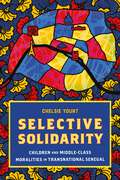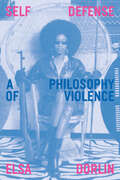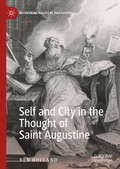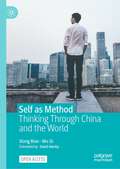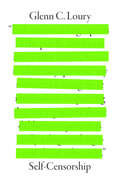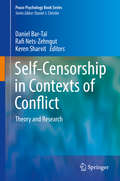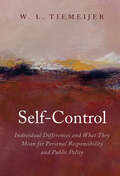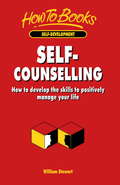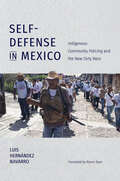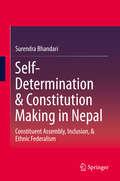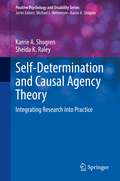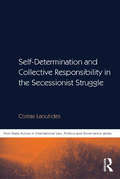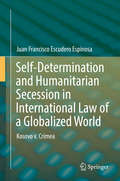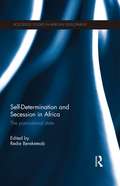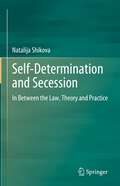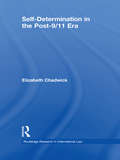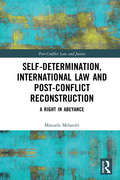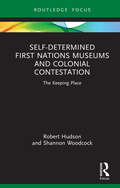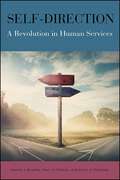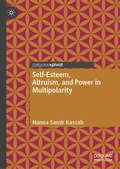- Table View
- List View
Selections from the Prison Notebooks of Antonio Gramsci
by Quintin Hoare Antonio Gramsci Geoffrey Nowell SmithAn extensive anthology, including his most important writings while in prison on philosophy, history, Communist Party formation, the intellectuals, and other subjects.
Selective Conscientious Objection: Accommodating Conscience And Security
by Michael F Noone JrDemographic trends indicate that, if the size of our nation's military forces is to be maintained through the 1990s, a larger proportion of the declining number of eligible young men and women must be recruited and retained. Some experts have suggested that it may be necessary to return to conscription in order to achieve the necessary force levels. However, the pool of young people, on whom the military must rely, have had the unprecedented experience of having been exhorted for most of their lives to conscientiously question the use of armed force. Our political and moral systems are in conflict over their right to refuse military service. Ninety-four percent of Americans believe in God and seventy percent attend a church or synagogue. 1 Their religious leaders insist on the individual's obligation to selectively object to the use of military force and urge that the law be changed to protect selective objectors. At present, the legal system recognizes only the conscientious objection claims of complete pacifists, who need not be religiously motivated.
Selective Licensing: The Basis for a Collaborative Approach to Addressing Health Inequalities (Routledge Focus on Environmental Health)
by Paul OattIn recent years, the private rented sector has overtaken social housing to become the main housing provider with some of the worse housing conditions that are linked to preventable health inequalities. This book seeks to expand upon previous research in the area with a focus on selective licensing and enforcement, using a case study to illustrate changes in working practices that have been bought about through new powers being made available to local authorities to issue civil financial penalties upon criminal landlords. The book examines the impact of this legislation on regulatory enforcement in the London Borough of Newham’s property licensing scheme, delivered in a multi-agency partnership across its private rented sector, and the outcomes of combining the use of licensing and traditional housing inspections with use of civil penalties in alternative to prosecution to address some of the worse effects of poor housing. The study also considers the limitations of employing informal actions to address such issues as well as identifying both the barriers to collaboration and the most effective strategies for service delivery where agencies – such as the police, border agency, council tax and local planning, irrespective of inter-agency competition – work together to achieve individual and shared objectives in evolving partnerships. The findings here will be of keen interest to environmental health professionals, academics, and indeed those operating in local authorities themselves.
Selective Persecution: The Legalization of American Fascism
by Simone GoldIn the early months of the COVID crisis, Dr. Simone Gold organized doctors and social media influencers to hold a White Coat Summit in Washington, DC, and she said something that nobody expected: the disease was treatable, and the panic was killing people. This press conference in front of the Supreme Court exceeded twenty million views within eight hours, becoming the most explosive viral video of its time. Instantaneously, Dr. Gold was transformed from an anonymous board-certified emergency physician and attorney to "public health" enemy number one. As a whistleblower who sacrificed her job to save a patient&’s life, she began to appear frequently on media and speak at events across the country, peeling back the deepening layers of medical propaganda. On January 6, 2021, she was an invited guest speaker alongside several congressmen at a Capitol grounds rally with a government-approved permit. That is where this story begins. Selective Persecution: The Legalization of American Fascism weaves a narrative from Dr. Gold&’s personal experience as a frontline doctor, and her forty-eight minutes inside the US Capitol Building on January 6. The author walks readers through an array of COVID lies and corruption, the course of January 6 itself, and the unfathomable progression of fascist government abuse that followed. She endured a violent FBI raid, extreme malice and misconduct by the Department of Justice, and was sentenced to federal prison amid shocking corruption in the judiciary. She was then further persecuted by the California Medical Board, the New York Bar, congressional committees, the TSA, and was widely defamed by the press and most of the world—all for the crime of daring to speak the truth. Selective Persecution is Dr. Gold&’s chilling story about how a weaponized government can be turned against any citizen.
Selective Security: War and the United Nations Security Council since 1945 (Adelphi series #395)
by Adam Roberts Dominik ZaumIn contrast to the common perception that the United Nations is, or should become, a system of collective security, this paper advances the proposition that the UN Security Council embodies a necessarily selective approach. Analysis of its record since 1945 suggests that the Council cannot address all security threats effectively. The reasons for this include not only the veto power of the five permanent members, but also the selectivity of all UN member states: their unwillingness to provide forces for peacekeeping or other purposes except on a case-by-case basis, and their reluctance to involve the Council in certain conflicts to which they are parties, or which they perceive as distant, complex and resistant to outside involvement. The Council’s selectivity is generally seen as a problem, even a threat to its legitimacy. Yet selectivity, which is rooted in prudence and in the UN Charter itself, has some virtues. Acknowledging the necessary limitations within which the Security Council operates, this paper evaluates the Council’s achievements in tackling the problem of war since 1945. In doing so, it sheds light on the division of labour among the Council, regional security bodies and states, and offers a pioneering contribution to public and governmental understanding of the UN’s past, present and future roles.
Selective Solidarity: Children and Middle-Class Moralities in Transnational Senegal (Contemporary Ethnography)
by Chelsie YountAn ethnography of Senegalese households in Paris and Dakar that analyzes ways families negotiate transnational kinshipSelective Solidarity examines how global inequalities change the ways transnational families negotiate “economic moralities,” or expectations about material obligations. Analyzing everyday exchanges in middle-class Senegalese households in Paris and Dakar, this book traces links between the language that mediates acts of food sharing and gift giving, and moral discourses that shape redistribution beyond the household. Foregrounding children’s role in transnational relations, anthropologist Chelsie Yount urges us to rethink questions of agency in economic practice.How do children grapple with the multiple, and sometimes contradictory, moral expectations they encounter at home and abroad? What can their practical struggles tell us about the ways the decline of the middle class in Europe impacts kinship connections in the African diaspora? The difficulties migrant parents face in transmitting class status to their French-born children lays bare the fact that for visible minorities, “integration” is not a state one can achieve once and for all, but a process that can potentially be undone. Yount argues that the French-born children of Senegalese, acutely aware of the discrimination they face in France, also forge affective and economic connections abroad that are key to creating and reproducing transnational kinship.At its heart, Selective Solidarity is about children’s experiences sharing food and giving gifts in Paris and on trips to Dakar. This book considers experiences of family life in global capitalism, focusing on middle-class downward mobility to highlight the ways socioeconomic relations are redefined as resources stretch thin. Highlighting the uneven terrain of transnational kinship, Selective Solidarity offers a new perspective on theories of value, revealing how moral expectations of kinship in Africa are bound up with values of immigrant integration in Europe. Together, these economic moralities shape families’ attempts to navigate the vicissitudes of tiered migration trajectories as heightened tensions surrounding migration reconfigure class structures globally.
Self Defense: A Philosophy of Violence
by Elsa DorlinA brilliant study of violent self-defense in the struggle for liberation by an award-winning philosopherIs violent self-defense ethical? In the history of colonialism, racism, sexism, capitalism, there has long been a dividing line between bodies "worthy of defending" and those who have been disarmed and rendered defenseless. In 1685, for example, France's infamous "Code Noir" forbade slaves from carrying weapons, under penalty of the whip. In nineteenth-century Algeria, the colonial state outlawed the use of arms by Algerians, but granted French settlers the right to bear arms. Today, some lives are seen to be worth so little that Black teenagers can be shot in the back for appearing "threatening" while their killers are understood, by the state, to be justified. That those subject to the most violence have been forcibly made defenseless raises, for any movement of liberation, the question of using violence in the interest of self-defense.Here, philosopher Elsa Dorlin looks across the global history of the left - from slave revolts to the knitting women of the French Revolution and British suffragists' training in ju-jitsu, from the Warsaw Ghetto Uprising to the Black Panther Party, from queer neighborhood patrols to Black Lives Matter, to trace the politics, philosophy, and ethics of self defense. In this history she finds a "martial ethics of the self": a practice in which violent self defense is the only means for the oppressed to ensure survival and to build a liveable future. In this sparkling and provocative book, drawing on theorists from Thomas Hobbes to Fred Hampton, Frantz Fanon to Judith Butler, Michel Foucault to June Jordan, Dorlin has reworked the very idea of modern governance and political subjectivity.Translated from the French by Kieran Aarons.
Self and City in the Thought of Saint Augustine (Recovering Political Philosophy)
by Ben HollandSelf and City in the Thought of Saint Augustine explores the analogy between the self and political society in the thought of St. Augustine of Hippo. This analogy is an important theme in the history of political thought. Attempts have been made to understand the state by examining the soul (since Plato), the body (as in medieval theories of the body politic) and the person (surviving to this day in such concepts as international legal personality). This book aims to reinstate the Augustinian part of the story. It argues that Augustine develops three analogies between self and city, as a society ordered by love: self-love in the case of the Earthly City; divided but improving love in the Pilgrim City; and love of others and of God in the City of God. It supplies thereby an overview of Augustine’s intellectual ‘system’ as it touches upon theology, psychology and anthropology, as well as politics, and also provides a new interpretation of Augustine’s important definition of the republic.
Self as Method: Thinking Through China and the World
by Biao Xiang Qi WuDespite China’s rise to the status of global power, many Chinese youths are anxious about their personal future, in large measure because the rapid changes have left them feeling adrift. This book, available in open access, provides a manifesto of intellectual activism that counsels China’s young people to think by themselves and for themselves. Consisting of three conversations between Xiang Biao, a social anthropologist, and Wu Qi, a rising journalist, the book probes how China has reached its current stage and how young people can make changes. The conversations touch on issues of mobility, education, family, relations between the self and the authority, centers and margins, China, and the world. The Chinese version was named the “most impactful book of 2021” by Douban, China’s premier website for rating books, films, and music. The English version is translated by David Ownby, who also penned an introduction.
Self-Censorship
by Glenn C. LouryThere is no such thing as free, unconstrained speech. Laws and constitutions may protect us from the state when we speak our minds. But the state is just one possible constraint. Glenn Loury, one of America’s most outspoken and important intellectuals, provides a provocative and dazzling analysis of the powerful social forces that can prevent speakers from voicing unpopular views in public forums.Every society, Loury notes, has norms to enforce. That can be a good thing: There ought to be social sanctions for, say, compulsive liars. When, however, a society shows a low degree of tolerance for speech about matters of political importance, self-censorship proliferates and public discourse and policy suffer. The answer, Loury argues, is for as many of us as possible to be braver and more human – to take a risk and unapologetically “live within the truth”.Loury first presented these ideas in the 1990s in a celebrated and prophetic essay about “political correctness.” In Self-Censorship he expands and updates the account, deploying his analytical powers and psychological acuity to diagnose our current political climate. The result illuminates prevailing social dynamics with the same brilliant and startling effect that made the paper an instant classic thirty years ago.
Self-Censorship in Contexts of Conflict
by Daniel Bar-Tal Keren Sharvit Rafi Nets-ZehngutThis groundbreaking volume explores the concept of self-censorship as it relates to individuals and societies and functions as a barrier to peace. Defining self-censorship as the act of intentionally and voluntarily withholding information from others in the absence of formal obstacles, the volumes introduces self-censorship as one of the socio-psychological mechanisms that prevent the free flow of information and thus obstruct proper functioning of democratic societies. Moreover it analyzes this socio-psychological phenomenon specifically in the context of intractable conflict, providing much evidence from the Israeli-Palestinian conflict. Moving from the micro to the macro level, the collected chapters put the individual as the focal unit of psychological analysis while embedding the individual in multiple levels of context including families, organizations, and societies. Following a firm conceptual explanation of self-censorship, a selection of both emerging and prominent scholars describe the ways in which self-censorship factors into families, organizations, education, academia, and other settings. Further chapters discuss self-censorship in military contexts, narratives of political violence, and the media. Finally, the volume concludes by looking at the ways in which harmful self-censorship in societies can be overcome, and explores the future of self-censorship research. In doing so, this volume solidifies self-censorship as an important phenomenon of social behavior with major individual and collective consequences, while stimulating exciting and significant new research possibilities in the social and behavioral sciences. Conceptually carving out a new area in peace psychology, Self Censorship in Contexts of Peace and Conflict will appeal to psychologists, sociologists, peace researchers, political scientists, practitioners, and all those with a wish to understand the personal and societal functioning of individuals in the real world.
Self-Control: Individual Differences and What They Mean for Personal Responsibility and Public Policy
by W. L. TiemeijerGood self-control is a crucial factor in the distribution of life outcomes, ranging from success at school and work, to good mental and physical health, and to satisfying romantic relationships. While in the last decades psychologists have learned much about this all-important trait, both social theory and politics have not caught up. Many academics and policymakers still seem to believe that everybody has unlimited capacity for self-control and that maintaining discipline is purely a matter of volition. This book shows that such beliefs are fundamentally mistaken. It presents the state-of-the-art in research on self-control, explains why this trait has been largely overlooked, and sets out the profound implications of this psychological research for moral responsibility, distributive justice and public policy. It shows that the growing emphasis in politics on 'personal responsibility' is deeply problematic, and outlines alternatives more in accord with human psychology.
Self-Counselling: How to develop the skills to positively manage your life
by William StewartFor some, self-counselling may be a valuable substitute for face-to-face counselling, for others it can provide a support to professional counselling sessions. In this practical self-help book, William Stewart introduces many self-counselling skills and techniques and uses case studies, and exercises working with dreams, imagination and intuition, to develop both a deeper self-awareness and the ability to solve propblems.
Self-Defense in Mexico: Indigenous Community Policing and the New Dirty Wars (Latin America in Translation/en Traducción/em Tradução)
by Luis Hernández NavarroIn Mexico and across other parts of Latin America local Indigenous peoples have built community policing groups as a means of protection where the state has limited control over, and even complicity in, crime and violence. Luis Hernandez Navarro, a leading Mexican journalist, offers a riveting investigation of these armed self-defense groups that sprang up around the time of the 1994 Zapatista uprising in Chiapas. Available in English for the first time, the book spotlights the intense precarity of everyday life in parts of Mexico. Hernandez Navarro shows how the self-defense response, which now includes wealthier rancher and farmer groups, is being transformed by Mexico's expanding role in the multibillion dollar global drug trade, by foreign corporations' extraction of raw minerals in traditionally Indigenous lands, and by the resulting social changes in local communities. But as Hernandez Navarro acknowledges, self-defense is highly controversial. Community policing may provide citizens with increased agency, but for government officials it can be a dangerous threat to the status quo. Leftists and liberals are wary of how the groups may be linked to paramilitary forces and vulnerable to manipulation by drug traffickers and the government alike. This book answers the urgent call to understand the dangerous complexities of government failures and popular solutions.
Self-Determination & Constitution Making in Nepal
by Surendra BhandariThis book systematically analyzes why constitutions do not survive in Nepal, despite sixty years of constitutional history. The author discusses the epistemology of ethnic federalism in Nepal and examines the challenges of nation building and post-nation constitutionalism. The work addresses the connection between ethnic identity, right to self-determination, constitution making and state restructuring, offering possible ways forward for Nepal. Chapters consider lessons to be drawn from the past and examine reasons for the abolition of monarchy in Nepal. The book highlights the major problems that the first elected Constituent Assembly (CA) faced in promulgating a new constitution, before it was dissolved in 2012. The concept of right to self-determination and its complexities at the domestic level are all explored, along with ways forward to address the problem of constitutionalism, ethnic federalism and democracy. The author offers solutions as to how the second CA could address problems to promulgate a new constitution. The book elaborates on the role that constitutionalism plays in constitution making and the survival of a constitution. Scholars of politics and international studies, policy makers and those with an interest in law and constitution in Asia will all find this work of interest.
Self-Determination and Causal Agency Theory: Integrating Research into Practice (Positive Psychology and Disability Series)
by Karrie A. Shogren Sheida K. RaleyThis book introduces Casual Agency Theory as a framework for defining self-determination and describing its development and essential characteristics. It synthesizes the research on promoting and enhancing self-determination and explores implications for practice in a disability context across the life course. The book also highlights future directions for theory, research, and practice in areas of positive psychology and disability. Key areas of coverage include: Theoretical basis of the development of self-determination as well as research findings and implications for practice across the life course. Issues relating to the implementation of evidence-based practices to promote self-determination in a disability context. Potential strategies for overcoming barriers to self-determination through research-based practices. Future directions for further integrating Casual Agency Theory into positive psychology interventions and the systems of supports in the disability field. Self-Determination and Causal Agency Theory is an essential resource for researchers, professors, and graduate students as well as clinicians, therapists, and other professionals in the fields of developmental and positive psychology, educational policy and practice, special education, social work, occupational, speech, and language therapy, public health, and healthcare policy.
Self-Determination and Collective Responsibility in the Secessionist Struggle (Non-State Actors in International Law, Politics and Governance Series)
by Costas LaoutidesThe often violent emergence of new independent states following the end of the Cold War generated discussion about the normative grounds of territorial separatism. A number of opposing approaches surfaced debating whether and under which circumstances there is a right for a community to secede from its host country. Overwhelmingly, these studies placed emphasis on the right to secession and neglected the moral stance of secessionist movements as agents in international relations. In this book Costas Laoutides explores the collective moral agency involved in secessionist struggles offering a theoretical model for the collective responsibility of secessionist groups. Case-studies on the Kurds and the people of Moldova-Transdniestria illustrate the author’s theoretical arguments as he seeks to establish how, although the principle of self-determination was envisaged as a means of gradually bestowing political power upon the people, it never managed to realize its full potential because it was interpreted strictly within a framework of exclusionary politics of identity.
Self-Determination and Humanitarian Secession in International Law of a Globalized World: Kosovo V. Crimea
by Juan Francisco Escudero EspinosaThis book addresses questions in connection with the international legal regime on demands for secession, which have arisen in various States. More specifically, it examines the unilateral declarations of independence by Kosovo in 2008, and by Crimea and its subsequent annexation by the Russian Federation in 2014. The work investigates the two cases so as to shed light on the international legal regime affecting entities that are smaller than a sovereign State. It analyzes the relevant principles of international law, the intention being to determine their scope and review them in light of the most recent practice and developments in international law. In turn, the book examines and explains the events of relevance for international law that occurred in the changing situations in Kosovo and Crimea. On the basis of these legal considerations, it explores how the international community can respond when faced with situations that may violate international law, together with the effectiveness of various measures. It also discusses whether certain situations might be legitimate as a concept could now be emerging that secession may be justified in specific circumstances, such as serious and widespread violations of basic human rights.
Self-Determination and Secession in Africa: The Post-Colonial State (Routledge Studies in African Development)
by Redie BereketeabThis book provides a unique comparative study of the major secessionist and self-determination movements in post-colonial Africa, examining theory, international law, charters of the United Nations, and the Organisation of African Unity (OAU)/African Union’s (AU) stance on the issue. The book explores whether self-determination and secessionism lead to peace, stability, development and democratisation in conflict-ridden societies, particularly looking at the outcomes in Eritrea and South Sudan. The book covers all the major attempts at self-determination and secession on the continent, extensively analysing the geo-political, economic, security and ideological factors that determine the outcome of the quest for self-determination and secession. It reveals the lack of inherent clarity in international law, social science theories, OAU/AU Charter, UN Charters and international conventions concerning the topic. This is a major contribution to the field and highly relevant for researchers and postgraduate students in African Studies, Development Studies, African Politics and History, and Anthropology.
Self-Determination and Secession: In Between the Law, Theory and Practice
by Natalija ShikovaThis book offers a comprehensive summary of extant international law scholarship on the topics of self-determination and secession and positions the concepts among present-day theory and relevant practice, illustrated through various ongoing cases and historical examples. The right to self-determination is among the least understood rights within international law. Theoretical dilemmas – as to whether there is a link between self-determination and secession – are nothing new. In essence, self-determination is a much broader concept than secession and obtaining independent statehood. Unilateral secession is not prohibited by international law, but neither is it per se welcomed or accepted in practice. Beyond the context of decolonization, secession claims have long been viewed with disapproval in international law, and lawyers have been extremely skeptical about the issue. Although this is still the case, there are also new trends and opportunities to explore situations in which secession can be accepted, legitimized, or even legally permissible. The yardstick for this is the diplomatic response to secessionism and the growing involvement of the international community in mediation and conflict resolution. Though finding solutions can be difficult, within the existing frame, the ongoing tension between the duty of every society to recognize pluralism and diversity on the one hand, and the inherent desire of every culture – whether majority, minority or indigenous – to protect its values and ensure conformity on the other, must be resolved. The practices and modalities that envisage the internal dimension of the right to self-determination as a right that is exercised within the state borders can offer such opportunities. The appropriate role of the state and the international community is to serve as mediators between competing forces and to set parameters that can transform destructive conflicts into productive political models.
Self-Determination in the Post-9/11 Era (Routledge Research in International Law)
by Elizabeth ChadwickThis book discusses the increasing tendency in certain government quarters to incorporate struggles by peoples for their self-determination into the wider anti-terrorist agenda of the post-9/11 era. This tendency distorts the laws of armed conflict and of peace alike. As inter-state anti-terrorist co-operation becomes more extensive, the transaction costs of international peace and security between states increase. Modes of domestic state governance are left increasingly to the vagaries of inter-state non-interference in the domestic affairs of each other. The ‘war on terror’ and an increasingly strict, domestic state law-and-order approach to silence political opponents increases the dangers for civilians, eliminates rights, and generates suspect communities. At the same time, public institutions and private corporations are harnessed into the mechanics of a broad project of prevention and control. Distinctively, the book considers the impact of the recent ‘war on terror’ on the politics of the self-determination of peoples. It draws together issues related to governmental forceful action, an increasing intolerance towards non-state violent acts, the content of international and regional codifications, expansions in state discretion, the encroachment of surveillance powers, and the interaction and overlap between intelligence and law enforcement agencies. Self-Determination in the Post-9/11 Era will be of interest to students and scholars of public international law, criminology, comparative criminal justice, terrorism and national security, politics, international relations, human rights, governance and public policy.
Self-Determination, International Law and Post-Conflict Reconstruction: A Right in Abeyance (Post-Conflict Law and Justice)
by Manuela MelandriThe right to self-determination has played a crucial role in the process of assisting oppressed people to put an end to colonial domination. Outside of the decolonization context, however, its relevance and application has constantly been challenged and debated. This book examines the role played by self-determination in international law with regard to post-conflict state building. It discusses the question of whether self-determination protects local populations from the intervention of international state-builders in domestic affairs. With a focus on the right as it applies to the people of an independent state, it explores how self-determination concerns that arise in the post-conflict period play out in relation to the reconstruction process. The book analyses the situation in Somalia as a means of drawing out the impact and significance of the legal principle of self-determination in the process of rebuilding post-conflict institutions. In so doing, it seeks to highlight how the relevance of self-determination is often overlooked in this context.
Self-Determined First Nations Museums and Colonial Contestation: The Keeping Place (Museums in Focus)
by Robert Hudson Shannon WoodcockSelf-Determined First Nations Museums and Colonial Contestation explores Indigenous practices of curation, object repatriation, and cross-cultural community engagement in a dynamic Koori museum. Grounded in the fact that Gunai Kurnai people have never ceded sovereignty, the text reorients dominant temporal and colonial approaches of museum studies to document and theorise Gunai Kurnai self-presentation and community engagement in the Krowathunkooloong Keeping Place. Researched and co-authored by the Cultural Manager of the Keeping Place, Gunai Kurnai Monero Ngarigo man Robert Hudson, and white Historian Shannon Woodcock, the book traces the temporal, social, and cultural considerations of the Elders who curated the permanent exhibition in the early 1990s. Discussing community management of a collection growing through the ongoing repatriation of tools, art, and Ancestor remains, the text also explores how Robert Hudson engages with visitors to the Keeping Place and local colonial history museums, and theorises the power of Gunai Kurnai work with individuals and institutions in the small museum context. Finally, Hudson and Woodcock demonstrate that the Keeping Place articulates sophisticated Gunai Kurnai-grounded methodologies of museum practice in relation to international critical Indigenous studies scholarship. Self-Determined First Nations Museums and Colonial Contestation provides a vital case study of an Indigenous museum space written from an inside perspective. As such, the book will be essential reading for scholars and students engaged in the study of museums and heritage, Indigenous peoples, decolonisation, race, anthropology, culture, and history.
Self-Direction: A Revolution in Human Services
by Kevin J. Mahoney Valerie J. Bradley Marc H. FentonIn the past, when people with disabilities and older adults needed help with activities of daily living and navigating their communities, they rarely had any choice about who helped them, when that support was delivered, or what the worker would or would not do. The self-direction movement changed all that by offering people the option to select their own workers and even create an individualized budget to help them live more independently. Written by experts who played a key part in the growth, evaluation, and dissemination of this revolutionary approach, Self-Direction describes the development of this movement through the authors' personal accounts. Also included are stories from actual participants in the movement who benefitted from this approach and from policymakers who saw how self-direction could help address states' problems. The book's conclusion discusses recommendations that can improve the way self-direction is delivered and how to spread its message so that all people with disabilities can have this choice.
Self-Esteem, Altruism, and Power in Multipolarity
by Hanna Samir KassabThis book asserts that state identities drive state motivations shaping state behavior. It describes several state motivations connected to self-esteem and identity: economic wealth, identity dominance through altruism, and controlling political outcomes for other states otherwise understood as decisionism. Part of this process is getting other states to acknowledge and recognize this self-image. As a result, self-esteem is at the core of state motivations, and seeks to connect the ideational with material reality. For instance, status quo powers, for instance the United States, will maintain their system because it is their system. On the other hand, revisionist powers like China and Russia will be motivated to amend or even overturn the system given their own understandings of self and self-esteem. Revisionist states may feel oppressed by an unfair or unjust international system, having exceptionalist identities of their own long supplanted by the United States. Feelings of humiliation define self-esteem and the need to overturn the system may be defined by these negative experiences. This book then adopts a constructivist framework of analysis and argues that narratives, identities, and whole realities are created through a cogent process of mutual constitution.
